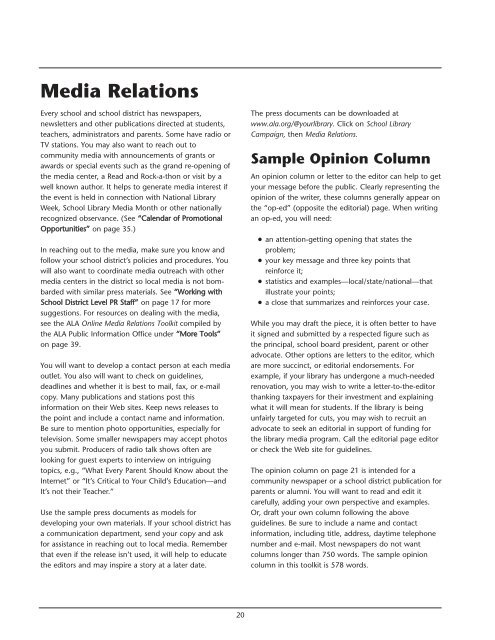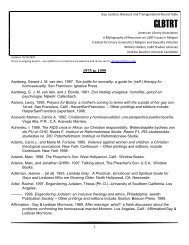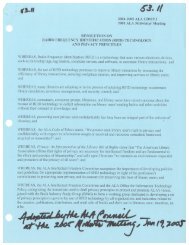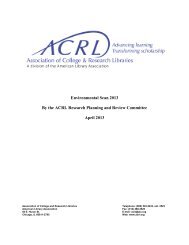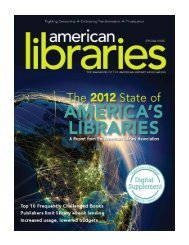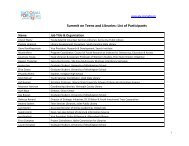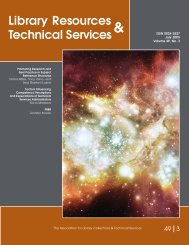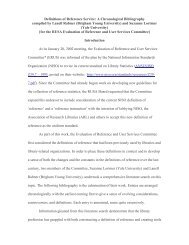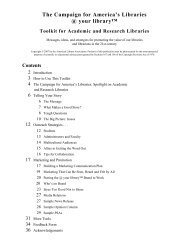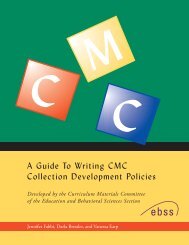Toolkit for School Library Media Programs - American Library ...
Toolkit for School Library Media Programs - American Library ...
Toolkit for School Library Media Programs - American Library ...
Create successful ePaper yourself
Turn your PDF publications into a flip-book with our unique Google optimized e-Paper software.
<strong>Media</strong> Relations<br />
Every school and school district has newspapers,<br />
newsletters and other publications directed at students,<br />
teachers, administrators and parents. Some have radio or<br />
TV stations. You may also want to reach out to<br />
community media with announcements of grants or<br />
awards or special events such as the grand re-opening of<br />
the media center, a Read and Rock-a-thon or visit by a<br />
well known author. It helps to generate media interest if<br />
the event is held in connection with National <strong>Library</strong><br />
Week, <strong>School</strong> <strong>Library</strong> <strong>Media</strong> Month or other nationally<br />
recognized observance. (See “Calendar of Promotional<br />
Opportunities” on page 35.)<br />
In reaching out to the media, make sure you know and<br />
follow your school district’s policies and procedures. You<br />
will also want to coordinate media outreach with other<br />
media centers in the district so local media is not bombarded<br />
with similar press materials. See “Working with<br />
<strong>School</strong> District Level PR Staff” on page 17 <strong>for</strong> more<br />
suggestions. For resources on dealing with the media,<br />
see the ALA Online <strong>Media</strong> Relations <strong>Toolkit</strong> compiled by<br />
the ALA Public In<strong>for</strong>mation Office under “More Tools”<br />
on page 39.<br />
You will want to develop a contact person at each media<br />
outlet. You also will want to check on guidelines,<br />
deadlines and whether it is best to mail, fax, or e-mail<br />
copy. Many publications and stations post this<br />
in<strong>for</strong>mation on their Web sites. Keep news releases to<br />
the point and include a contact name and in<strong>for</strong>mation.<br />
Be sure to mention photo opportunities, especially <strong>for</strong><br />
television. Some smaller newspapers may accept photos<br />
you submit. Producers of radio talk shows often are<br />
looking <strong>for</strong> guest experts to interview on intriguing<br />
topics, e.g., “What Every Parent Should Know about the<br />
Internet” or “It’s Critical to Your Child’s Education—and<br />
It’s not their Teacher.”<br />
Use the sample press documents as models <strong>for</strong><br />
developing your own materials. If your school district has<br />
a communication department, send your copy and ask<br />
<strong>for</strong> assistance in reaching out to local media. Remember<br />
that even if the release isn’t used, it will help to educate<br />
the editors and may inspire a story at a later date.<br />
20<br />
The press documents can be downloaded at<br />
www.ala.org/@yourlibrary. Click on <strong>School</strong> <strong>Library</strong><br />
Campaign, then <strong>Media</strong> Relations.<br />
Sample Opinion Column<br />
An opinion column or letter to the editor can help to get<br />
your message be<strong>for</strong>e the public. Clearly representing the<br />
opinion of the writer, these columns generally appear on<br />
the “op-ed” (opposite the editorial) page. When writing<br />
an op-ed, you will need:<br />
● an attention-getting opening that states the<br />
problem;<br />
● your key message and three key points that<br />
rein<strong>for</strong>ce it;<br />
● statistics and examples—local/state/national—that<br />
illustrate your points;<br />
● a close that summarizes and rein<strong>for</strong>ces your case.<br />
While you may draft the piece, it is often better to have<br />
it signed and submitted by a respected figure such as<br />
the principal, school board president, parent or other<br />
advocate. Other options are letters to the editor, which<br />
are more succinct, or editorial endorsements. For<br />
example, if your library has undergone a much-needed<br />
renovation, you may wish to write a letter-to-the-editor<br />
thanking taxpayers <strong>for</strong> their investment and explaining<br />
what it will mean <strong>for</strong> students. If the library is being<br />
unfairly targeted <strong>for</strong> cuts, you may wish to recruit an<br />
advocate to seek an editorial in support of funding <strong>for</strong><br />
the library media program. Call the editorial page editor<br />
or check the Web site <strong>for</strong> guidelines.<br />
The opinion column on page 21 is intended <strong>for</strong> a<br />
community newspaper or a school district publication <strong>for</strong><br />
parents or alumni. You will want to read and edit it<br />
carefully, adding your own perspective and examples.<br />
Or, draft your own column following the above<br />
guidelines. Be sure to include a name and contact<br />
in<strong>for</strong>mation, including title, address, daytime telephone<br />
number and e-mail. Most newspapers do not want<br />
columns longer than 750 words. The sample opinion<br />
column in this toolkit is 578 words.


